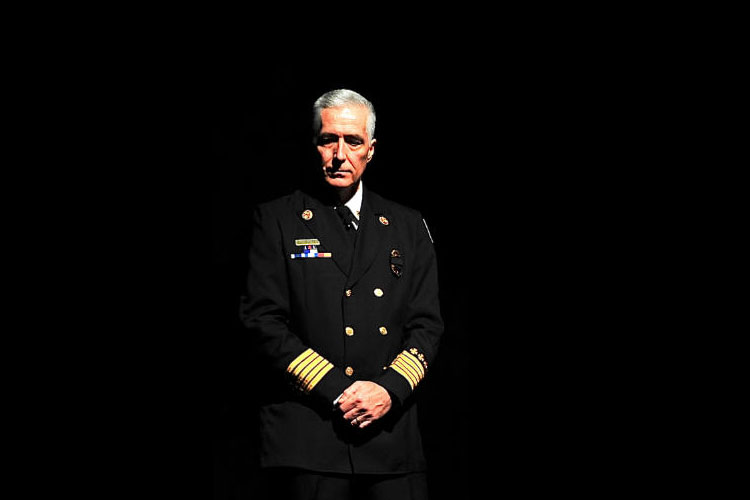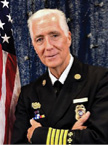
editor’s opinion ❘ By BOBBY HALTON

The story goes that the chief calls or sends you a message—years ago, a memo; today, an e-mail, a voicemail, or a text. According to the legend, it goes something like, “See me tomorrow, my office, 0900.” The setup is that you don’t have much of a relationship with the chief—fact is, you might have some differences with her. To make it even more intriguing, this is not a department where you normally visit the chief’s office, and being summoned generally is not a good thing. The trap is set, the fuse is lit, and now you get to fill in the blanks.
The time between your appointment and receiving the note is where we find human nature at work. Although we humans are normally pretty optimistic creatures, we are also very aware of the dominance hierarchy. To quote George Orwell in his critique on the epic disaster known as socialism, “All animals are equal, but some animals are more equal than others.” Even given inequality, most firefighters will project a positive outcome: All things being equal, we can lick most fires; defeat most barriers to access; and overcome most obstacles, given the right tools and training. We write our policies and procedures assuming that, given a certain set of conditions in a certain setting, the prescribed actions will achieve a positive outcome, and everything will turn out okay.
We deal very effectively with tools, objects, settings, and conditions—not so much with our own imaginations. Everyone is traveling together through time hoping to get somewhere— promoted, married, retired, rich, fulfilled, and any number of standard outcomes to the human condition. Some of us have very detailed images of our future selves. Some of us have very scripted plans and ideas of how we are going to get from point A to point B. We see ourselves using tools and objects to achieve varying degrees of accomplishment toward the idealized outcome we have in our minds as point B.
MORE BOBBY HALTON
Initial Reporting, Shared Understanding
All of this obviously brings us to a discussion on the clean cab concept. The recent studies on contamination, exposure, and firefighter health are uncovering that not only are we at risk for exposure to products that may affect our health at fires and other emergencies but also our stations, our rigs, our gear, and our personal vehicles may be sources for exposure. We have industrial hygienists who recommend that we keep these areas as clean as possible and that we clean our tools and equipment that we bring into these areas. Fair enough—no firefighter wants to get cancer or autoimmune diseases or transmit anything that could sicken someone else.
Except for a few compulsive disorder types, also known as compulsive hoarding firefighters, no one is advocating for the “dirty cab concept.” But why, then, the outcry when the topic comes up from time to time in our staff meetings, conferences, and discussions? Well, “See me tomorrow, my office, 0900.” Where do our minds go the minute we hear or get that message? What does she want? What did I do or what didn’t I do? How is this, whatever it may be, going to affect my life; disrupt my plans; or make things more difficult, challenging, or painful?
Our minds go to the worst-case default when we have to imagine imposed change. We get immediately defensive: “She is always picking on me, always demanding more of me” or “She has always had it in for me.” Then we get really creative and look to past events that may have been misinterpreted. “I bet it is about the cops we yelled at for blocking the plug; she always takes their side.” Then we go to self-justifying thoughts: “I don’t have to take this. I am calling the union. It is about time I told her off. I am going to give that cop lover a piece of my mind tomorrow morning. I am going to march in there and let her know I should have stretched line through his stupid window instead of just telling him to move his stupid car!”
The story goes, after a sleepless night, three phone calls to the union steward, and a bottle and a half of Pepto Bismol®, you march boldly, yet apprehensively, into the chief’s office at 0900, ready to take her down, the union on speed dial. The chief turns, smiles, and says, “Hey, I got some complimentary box tickets to the game Saturday, and I thought you might enjoy taking the family; interested?” You stammer and say something like, “You bet; thanks, Chief,” and although not chronologically any older, you feel like 10 years have come and gone.
So, clean cab is going to upset our world, it will screw up operational capabilities—that is what we say because we can’t have our self-contained breathing apparatus in the rigs. That is true if they are dirty but not true if they are clean. We can’t wear our gear on the way to a fire—well, our gear should be clean before the fire, so that’s okay. Well, what about after, if it is freezing out? Do we have to change? No, but we do have to clean the rig after we get back in house.
We used to wash hose after each fire. It was dirty. We put it in rolls on the tailboard for the trip back. We can put any gear, tool, or whatever that we can’t clean on site somewhere where we aren’t exposed to it until we can clean it. Clean cab? “See me tomorrow, my office, 0900.”

RELATED
Redefining the Clean Cab Concept
The ‘Clean Cab Concept’ Becomes a Reality

